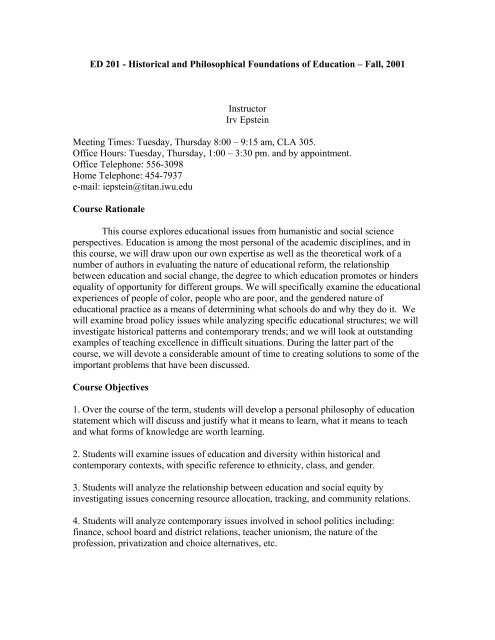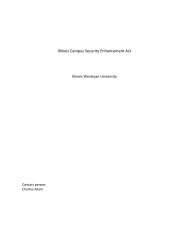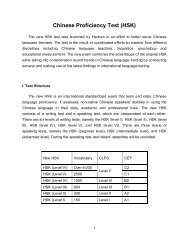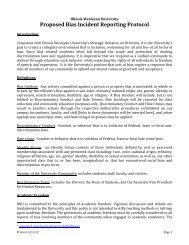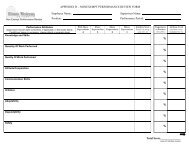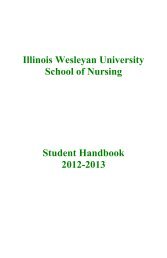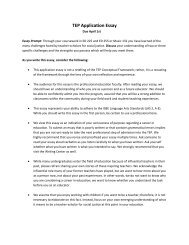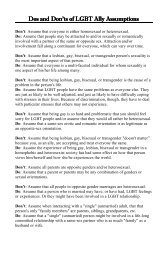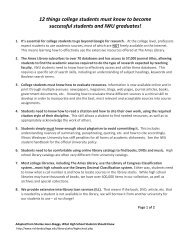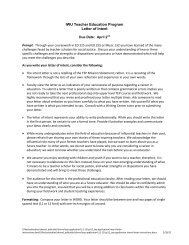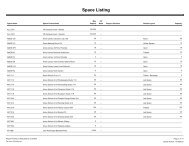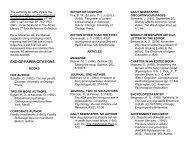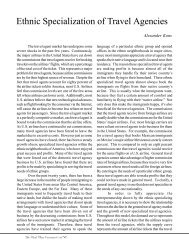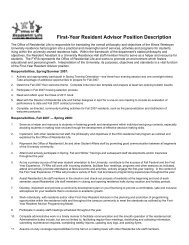ED 201 - Historical and Philosophical Foundations of Education ...
ED 201 - Historical and Philosophical Foundations of Education ...
ED 201 - Historical and Philosophical Foundations of Education ...
Create successful ePaper yourself
Turn your PDF publications into a flip-book with our unique Google optimized e-Paper software.
<strong>ED</strong> <strong>201</strong> - <strong>Historical</strong> <strong>and</strong> <strong>Philosophical</strong> <strong>Foundations</strong> <strong>of</strong> <strong>Education</strong> – Fall, 2001<br />
Instructor<br />
Irv Epstein<br />
Meeting Times: Tuesday, Thursday 8:00 – 9:15 am, CLA 305.<br />
Office Hours: Tuesday, Thursday, 1:00 – 3:30 pm. <strong>and</strong> by appointment.<br />
Office Telephone: 556-3098<br />
Home Telephone: 454-7937<br />
e-mail: iepstein@titan.iwu.edu<br />
Course Rationale<br />
This course explores educational issues from humanistic <strong>and</strong> social science<br />
perspectives. <strong>Education</strong> is among the most personal <strong>of</strong> the academic disciplines, <strong>and</strong> in<br />
this course, we will draw upon our own expertise as well as the theoretical work <strong>of</strong> a<br />
number <strong>of</strong> authors in evaluating the nature <strong>of</strong> educational reform, the relationship<br />
between education <strong>and</strong> social change, the degree to which education promotes or hinders<br />
equality <strong>of</strong> opportunity for different groups. We will specifically examine the educational<br />
experiences <strong>of</strong> people <strong>of</strong> color, people who are poor, <strong>and</strong> the gendered nature <strong>of</strong><br />
educational practice as a means <strong>of</strong> determining what schools do <strong>and</strong> why they do it. We<br />
will examine broad policy issues while analyzing specific educational structures; we will<br />
investigate historical patterns <strong>and</strong> contemporary trends; <strong>and</strong> we will look at outst<strong>and</strong>ing<br />
examples <strong>of</strong> teaching excellence in difficult situations. During the latter part <strong>of</strong> the<br />
course, we will devote a considerable amount <strong>of</strong> time to creating solutions to some <strong>of</strong> the<br />
important problems that have been discussed.<br />
Course Objectives<br />
1. Over the course <strong>of</strong> the term, students will develop a personal philosophy <strong>of</strong> education<br />
statement which will discuss <strong>and</strong> justify what it means to learn, what it means to teach<br />
<strong>and</strong> what forms <strong>of</strong> knowledge are worth learning.<br />
2. Students will examine issues <strong>of</strong> education <strong>and</strong> diversity within historical <strong>and</strong><br />
contemporary contexts, with specific reference to ethnicity, class, <strong>and</strong> gender.<br />
3. Students will analyze the relationship between education <strong>and</strong> social equity by<br />
investigating issues concerning resource allocation, tracking, <strong>and</strong> community relations.<br />
4. Students will analyze contemporary issues involved in school politics including:<br />
finance, school board <strong>and</strong> district relations, teacher unionism, the nature <strong>of</strong> the<br />
pr<strong>of</strong>ession, privatization <strong>and</strong> choice alternatives, etc.
Required Texts<br />
1. Carger, Chris Liska. Of Borders <strong>and</strong> Dreams. New York: Teachers College Press,<br />
1996.<br />
2. Foley, Douglas. The Heartl<strong>and</strong> Chronicles. Philadelphia, U. <strong>of</strong> Pennsylvania, 1995.<br />
3. Kozol, Jonathan. Savage Inequalities. New York: Crown, 1991.<br />
4).Michie, Gregory. New York: Teachers College Press, 1999.<br />
5. Orenstein, Peggy. Schoolgirls. New York: Anchor, 1994.<br />
6. Rousmaniere, Kate. City Teachers. New York: Teachers College Press, 1997.<br />
Course Requirements<br />
Requirements<br />
Grading<br />
1.Individual Report <strong>of</strong> a local school board meeting. 50<br />
points<br />
2. Group Presentation on one <strong>of</strong> the required texts for the class<br />
<strong>and</strong> small assignment group work.<br />
3. Individual attendance <strong>and</strong> participation including<br />
a minimum <strong>of</strong> five e-mail listserve entries <strong>and</strong> regular reactions to<br />
class readings in written <strong>and</strong> oral form.<br />
50 points<br />
100 points<br />
4. 3 Comparative book reviews (7 pages each); for each review,<br />
you will compare <strong>and</strong> contrast two <strong>of</strong> the different books that will<br />
have been read during the course <strong>of</strong> the term.. Two can be rewritten 600<br />
points<br />
for a higher grade.<br />
5. Group project/class simulation. 75 points<br />
6. In-class midterm essay examination based upon class readings <strong>and</strong><br />
discussions.<br />
75 points<br />
7. Self-evaluation statement (3-5 pages) 50 points<br />
.<br />
Total<br />
1000 points
Approximate Grading Scale<br />
1000 - 960 points A<br />
959 - 920 points A-<br />
919 - 880 points B+<br />
879 - 840 points B<br />
839 - 800 points B-<br />
799 - 760 points C+<br />
759 - 720 -points C<br />
719 - 680 - points C-<br />
679 - 640 points D<br />
Below 640 points F
Description <strong>of</strong> Assignments<br />
School Board Meeting Report<br />
One <strong>of</strong> the requirements <strong>of</strong> the course is to attend a school board meeting. In your 3-4<br />
page report <strong>of</strong> that meeting, you should list the names <strong>of</strong> 1) the members <strong>of</strong> the board; 2)<br />
the superintendent; 3) board staff (secretaries, etc.) <strong>and</strong> note their ethnicity <strong>and</strong> gender.<br />
You should include if available, an agenda for the meeting <strong>and</strong> comment upon its<br />
appropriateness. It would be useful to record board votes as issues come up <strong>and</strong> comment<br />
upon the degree <strong>of</strong> conflict or unaminity among board members <strong>and</strong> between board<br />
members <strong>and</strong> the superintendent. It would also be helpful to comment upon the degree <strong>of</strong><br />
community participation, the extent to which diverse community voices were visible <strong>and</strong><br />
expressive, <strong>and</strong> the reactions <strong>of</strong> board members to community concerns. Finally, try to<br />
determine whether 1) board members had comprehensive knowledge <strong>of</strong> the issues they<br />
were addressing, 2) if board members saw themselves as trustees or delegates, <strong>and</strong> 3) if<br />
the board acted as if it were dominated, pluralistic or inert (we will cover the definitions<br />
<strong>of</strong> these terms during the course).<br />
Local School Board Addresses <strong>and</strong> Meeting Times<br />
District Address Telephone Meeting Times<br />
(check to verify)<br />
Bloomington 300 E. Monroe 827-6031 7:30 pm 2nd <strong>and</strong> 4th<br />
Weds.<br />
Weds.<br />
(District 87)<br />
Normal 1809 W. Hovey 452-4476 7:00 pm, 2nd <strong>and</strong> 4th<br />
(District 5)<br />
Weds.<br />
Lexington Greenwich <strong>and</strong> 365-4141 7:30 CST;<br />
8:00 CDT<br />
Cherry Sts.<br />
3rd Thursday<br />
Chenoa 200 S. Third 945-7214 7:15 pm. 3rd Mon.<br />
Heyworth 308 W. Clevel<strong>and</strong> 473-3727 7:00 pm. 3rd Weds.<br />
Leroy 600 E. Pine 962-4211 7:00 pm 2nd Mon.<br />
Olympia RR.1, Stanford 379-6011 7:00 pm. 2nd<br />
Monday; Nov-<br />
March; 8:00 pm.<br />
April-October
Tri-Valley 410 E. Washington, 378-2351 7:00 pm CST; 7:30pm<br />
Downs<br />
CDT, 1st <strong>and</strong> 3 rd<br />
Mon.<br />
Part One: Model School<br />
Model School/Simulation <strong>of</strong> School Board Meeting<br />
During the latter part <strong>of</strong> the course, you will work in small groups to devise a model<br />
school, given an imaginary student body reflective <strong>of</strong> national norms. You will be<br />
expected to devise your own curriculum, governance structure, mission statement, <strong>and</strong><br />
budget using information gained from the internet, from class readings, <strong>and</strong> from<br />
consultations with local school district <strong>of</strong>ficials. Each group will present its model school<br />
proposal orally before the rest <strong>of</strong> the class where the proposals will be evaluated. They<br />
will then be submitted to the instructor in written form. Finally, we will combine the best<br />
characteristics <strong>of</strong> all <strong>of</strong> the proposals for one model school.<br />
Part Two: School Board Meeting<br />
We will reenact a hypothetical school board meeting where the proposal to create the<br />
class model school will be considered. Everyone in the class will be given a role from<br />
board member to superintendent to parent, teacher or student. Each participant will try to<br />
make sure that her/his position is advanced during the meeting <strong>and</strong> will write a brief (2<br />
page) summary <strong>of</strong> the strategy <strong>and</strong> tactics employed to further one's cause.<br />
Group Presentations<br />
As a part <strong>of</strong> your small group grade, your group will be expected to teach one lesson,<br />
based upon one <strong>of</strong> the required books <strong>of</strong> the course. The group will present material it<br />
considers important to an underst<strong>and</strong>ing <strong>of</strong> the book <strong>and</strong> will be encouraged to use<br />
discussion, lecture, video <strong>and</strong> alternative teaching methods to present the material. The<br />
group presentation will be graded according to the degree <strong>of</strong> consistent <strong>and</strong> uniform<br />
participation on the part <strong>of</strong> every group member, originality <strong>of</strong> presentation, clear<br />
underst<strong>and</strong>ing <strong>of</strong> the material, <strong>and</strong> ability to engage the rest <strong>of</strong> the class in the<br />
presentation. I will meet with each group outside <strong>of</strong> class to help in the planning <strong>of</strong> the<br />
presentation.<br />
E-mail entries<br />
We will start our own list-serve group on e-mail <strong>and</strong> every member <strong>of</strong> the class will be<br />
expected to make at least 5 contributions. Your contribution can be a comment upon a<br />
theme raised during class discussion, a reaction to a book, a speaker, or an activity. Or,
you can simply comment upon what another person says on e-mail. The idea is to extend<br />
discussion beyond the classroom without direct instructor interference. At least two <strong>of</strong><br />
your e-mails should include references to books, articles, websites, or sources you have<br />
discovered that pertain to the issue at h<strong>and</strong> outside <strong>of</strong> regular classroom exchange. This is<br />
your opportunity to talk to each other about issues that arise in class. I will monitor the e-<br />
mail only to make sure that the minimum number <strong>of</strong> entries are fulfilled <strong>and</strong> that you<br />
mention at least two external sources in your discussions. This activity will constitute part<br />
<strong>of</strong> your participation <strong>and</strong> attendance grade.<br />
Comparative Book Reviews<br />
Three 7 page book reviews are required for the course. The reviews ask you to compare<br />
two <strong>of</strong> the books we will have read during the term. For each review, you should identify<br />
the title, author, city <strong>of</strong> publication, publisher, <strong>and</strong> date <strong>of</strong> publication <strong>of</strong> the books<br />
subject to review.<br />
Review Number 1 – George Michie, in his book Holler if You Hear Me, tries to use the<br />
actual voices <strong>of</strong> his students in explaining how <strong>and</strong> why teaching can make a positive<br />
difference in their lives. Kate Rousmaniere, in her book City Teachers, argues that New<br />
York City teachers historically have battled for control over their working conditions <strong>and</strong><br />
the teaching methods they would prefer to use, <strong>of</strong>ten with little success. Can inner-city<br />
teachers make a difference in their own lives <strong>and</strong> in the lives <strong>of</strong> the children they teach?<br />
Answer this question by comparing both <strong>of</strong> these books, examining the premises each<br />
author makes, the evidence that they use in support <strong>of</strong> their premises, <strong>and</strong> the adequacy <strong>of</strong><br />
their conclusions.<br />
Review Number 2 – Jonathan Kozol, in Savage Inequalities, uses his role as an outsider<br />
to demonstrate how the systematic injustices <strong>of</strong> the American educational system give<br />
those who are disadvantaged little help. Douglas Foley, in The Heartl<strong>and</strong> Chronicles,<br />
uses his role as an anthropologist <strong>and</strong> former member <strong>of</strong> a rural community, to examine<br />
how schools in his hometown were <strong>and</strong> continue to be insensitive to issues <strong>of</strong> ethnic<br />
diversity. He recounts experiences from his own life <strong>and</strong> interviews former friends <strong>and</strong><br />
associates in arriving at his conclusions. Explain the strengths <strong>and</strong> weaknesses <strong>of</strong> each<br />
methodology, determine which picture <strong>of</strong> educational <strong>and</strong> social inequality is more<br />
accurate, <strong>and</strong> why.<br />
Review Number 3 - Chris Carger, in Of Borders <strong>and</strong> Dreams, shows how his schooling<br />
failed Alej<strong>and</strong>ro <strong>and</strong> the Juarez family at every step, while Peggy Ornstein, in<br />
Schoolgirls, argues that schools are systematically biased against girls. Explain why you<br />
agree or disagree with the extent <strong>of</strong> their pessimism <strong>and</strong> give a series <strong>of</strong> concrete steps<br />
that you think would improve educational outcomes for girls <strong>and</strong> for Latino children <strong>of</strong><br />
all types.<br />
For each review, assume that the reader has not read the books in question <strong>and</strong> back up<br />
your arguments with evidence from the texts, class discussions, <strong>and</strong> personal experience.
Self-Evaluation<br />
Your final assignment will be a self-evaluation statement (3-5 pages in length) where you<br />
will comment upon the intellectual growth you have made during the course <strong>of</strong> the<br />
semester. In writing this evaluation, you will be asked to comment upon what you have<br />
learned from each <strong>of</strong> the assignments completed in the course, what you have learned<br />
from your peers through group interaction, <strong>and</strong> in what areas you hope to learn more as<br />
you continue to pursue your studies at Illinois Wesleyan University.<br />
Grading <strong>and</strong> Assessment Procedures<br />
This course is designed to <strong>of</strong>fer varied forms <strong>of</strong> assessment throughout the term <strong>and</strong> it is<br />
expected that you will demonstrate competence in all <strong>of</strong> the prescribed forms <strong>of</strong> oral <strong>and</strong><br />
written expression in order to receive credit for the class. Although instructor to student<br />
<strong>and</strong> student to instructor expectations will become clearer as the course proceeds, please<br />
keep in mind the following general performance criteria that will be used in the course.<br />
I. Evaluation <strong>of</strong> formal written work<br />
1) "A" papers demonstrate excellence in content, organization <strong>and</strong> style. The author<br />
presents a unified thesis, followed by a sound organizational strategy. The ideas that are<br />
presented are engaging <strong>and</strong> illuminate insights not readily apparent in reading the<br />
required text. Assertions are supported by evidence <strong>and</strong> logical argument. Where<br />
appropriate, contrary arguments <strong>and</strong> conflicting evidence are noted <strong>and</strong> reasons for<br />
disagreements are made clear. The author is aware <strong>of</strong> her/his role, the appropriate<br />
audience for whom the piece is intended, <strong>and</strong> presents ideas that are clearly stated <strong>and</strong><br />
easy to underst<strong>and</strong>. A papers rarely contain any spelling or grammatical mistakes.<br />
2) “A-” papers differ from A papers in that there may be one or two fewer truly engaging<br />
<strong>and</strong> illuminating insights that are presented. Still, the ideas that are expressed are creative<br />
<strong>and</strong> insightful, assertions are supported by evidence <strong>and</strong> logical argument, <strong>and</strong> contrary<br />
arguments are presented when called for. Grammatically <strong>and</strong> stylistically, the author may<br />
make one mistake but this is the exception. In short, this is not the perfect paper, but it<br />
comes close.<br />
3) "B+" papers are solid pieces <strong>of</strong> work that demonstrate good ideas <strong>and</strong> insights that are<br />
somewhat more common <strong>and</strong> perhaps less useful than those presented in "A" papers. The<br />
organization <strong>and</strong> style <strong>of</strong> the papers are <strong>of</strong> a generally high quality although there may be<br />
an occasional inconsistency in this area. Assertions are supported by evidence <strong>and</strong> logical<br />
argument although one might expect further elaboration <strong>and</strong> development <strong>of</strong> the material<br />
that is presented. Only a few spelling or grammatical errors are in evidence in a B+ paper.<br />
4) “B” papers are solid pieces <strong>of</strong> work that demonstrate author familiarity <strong>and</strong><br />
engagement with the important issues at h<strong>and</strong>. A “B” paper fulfills the teacher’s<br />
expectations for the assignment, but it is not exceptional or extraordinary in any way. The
writer will demonstrate logical reasoning <strong>and</strong> support her/his arguments with relevant<br />
evidence but will not take any chances or reach beyond a conventional underst<strong>and</strong>ing <strong>of</strong><br />
the material.<br />
5) “B-” papers are solid pieces <strong>of</strong> work with one or two slight exceptions. The author will<br />
demonstrate general familiarity <strong>and</strong> engagement with important issues but may miss the<br />
implications <strong>of</strong> one important argument or make a statement that is empirically <strong>and</strong><br />
factually incorrect. Still this will not take away from a general underst<strong>and</strong>ing <strong>of</strong> the issues<br />
at h<strong>and</strong>.The paper will for the most part be well organized, but there may be a particular<br />
paragraph that is stylistically or grammatically inappropriate.<br />
6) "C" papers are adequate pieces <strong>of</strong> work that demonstrate acceptable underst<strong>and</strong>ing <strong>of</strong><br />
the assignment. The insights <strong>and</strong> ideas presented will rarely go beyond the obvious <strong>and</strong><br />
there may be some organizational <strong>and</strong> stylistic inconsistencies that detract from the<br />
content <strong>of</strong> the piece. It is generally clear that the author underst<strong>and</strong>s the nature <strong>of</strong> the<br />
assignment <strong>and</strong> appreciates her/his role <strong>and</strong> that <strong>of</strong> the audience for whom the piece is<br />
intended. But the use <strong>of</strong> evidence <strong>and</strong> logical argument while present throughout the<br />
piece, is limited. Sometimes, one argument will be clearly delivered but opposing points<br />
<strong>of</strong> view will not be considered. Clarity <strong>of</strong> expression is present although it may be<br />
seriously lacking in a few areas. Grammatical <strong>and</strong> spelling errors may be present, but one<br />
can still underst<strong>and</strong> the author’s intention <strong>and</strong> meaning. C+, C, <strong>and</strong> C- grades will differ<br />
depending upon how well the author communicates her/his underst<strong>and</strong>ing <strong>of</strong> the<br />
assigment, <strong>and</strong> demonstrates evidence for having completed the required reading in its<br />
entirety.<br />
7) "D" papers may have some virtues: an occasional insight or good idea, but they are<br />
marred by unclear writing, organization, <strong>and</strong> style. They demonstrate lack <strong>of</strong> attention to<br />
audience <strong>and</strong> communicate the purpose <strong>of</strong> the piece unclearly, <strong>and</strong> they are lacking in the<br />
presentation <strong>of</strong> solid argumentation <strong>and</strong> evidence. Upon reading this type <strong>of</strong> paper, one<br />
can’t be absolutely sure that the author underst<strong>and</strong>s the assignment <strong>and</strong> has read the<br />
required material, necessary to complete the assignment intelligently. Grammatical <strong>and</strong><br />
spelling errors are abundant.<br />
8) "F" papers fail to address the requirements <strong>of</strong> the assignment. Their authors show no<br />
insight into the work being studied <strong>and</strong> show poor attention to organization <strong>and</strong> style.<br />
These are papers that <strong>of</strong>ten are written at the last minute <strong>and</strong> do not clearly demonstrate<br />
that the author underst<strong>and</strong>s her/his role or the nature <strong>of</strong> the audience for whom the work<br />
is to be written. No evidence is given to demonstrate that the author has actually read the<br />
required material or completed the required tasks prior to writing this paper. No effort is<br />
made to organize one's thoughts clearly.<br />
All formal written work for the course should be pro<strong>of</strong>read <strong>and</strong> spell checked before<br />
being turned in.
Informal written work<br />
During this course, you will be asked to complete informal written work as well as more<br />
polished formal written work. Examples <strong>of</strong> informal written work include your initial<br />
philosophy <strong>of</strong> education statement, interview with an educator, answers to chapter<br />
questions, extra-credit summaries <strong>of</strong> speaker <strong>and</strong> film presentations, etc. This work will<br />
be graded on a check, check plus, check minus basis, or zero basis. A check indicates that<br />
the work is <strong>of</strong> acceptable quality <strong>and</strong> that you have met the basic requirements <strong>of</strong> the<br />
assignment. A check plus indicates that your insights are truly exceptional <strong>and</strong> that you<br />
have surpassed the requirements for the assignment. A check minus indicates that the<br />
assignment is deficient in one aspect: lack <strong>of</strong> thought or attention to the task,<br />
unacceptable quality <strong>of</strong> the written work, etc. As there will be many opportunities to<br />
complete informal written work, revisions will not be accepted for informal work. In<br />
addition, I will evaluate your informal work when assessing your final grade. If your<br />
point totals place you in an ambiguous position with regard to your final letter grade,<br />
your performance on your informal assignments will be used to reconcile all ambiguities.<br />
II. Evaluation <strong>of</strong> Oral Expression <strong>and</strong> Participation<br />
In order for this class to work, everyone must extensively participate orally, both on an<br />
individual basis in front <strong>of</strong> the larger class <strong>and</strong> within smaller group settings. As difficult<br />
as it may be to speak in front <strong>of</strong> others, it is absolutely essential that each person makes<br />
an effort to share their wisdom with the rest <strong>of</strong> the class. Quality oral participation does<br />
not mean monopolizing discussion. It involves listening, reflecting, critiquing,<br />
encouraging <strong>and</strong> sharing. We will try as much as possible to create a classroom<br />
environment where these skills are allowed to flourish, in a spirit <strong>of</strong> tolerance <strong>and</strong> mutual<br />
respect. When we deal with controversial issues where individuals have strongly held<br />
opinions, we will try to encourage each other to reassess <strong>and</strong> reevaluate strongly held<br />
views. The overall evaluation <strong>of</strong> oral participation will therefore be based upon the<br />
consistency <strong>of</strong> performance as well as the quality <strong>of</strong> one's contributions. Be prepared to<br />
have your views challenged in this class, but underst<strong>and</strong> that this does not mean that your<br />
views are unimportant or unappreciated.
III. Evaluation <strong>of</strong> Attendance<br />
Each class member is expected to attend regularly <strong>and</strong> to notify the instructor in advance<br />
if it is necessary to miss class because <strong>of</strong> a special circumstance. Attending class is more<br />
than a personal choice: it is a social responsibility, for the class as a whole will be harmed<br />
without your continued presence. If there are extenuating circumstances that prevent you<br />
from fulfilling this commitment on a regular basis, it is your responsibility to inform the<br />
instructor as soon as possible <strong>of</strong> this fact. In addition, it will be necessary to meet with<br />
small group members at a convenient time outside <strong>of</strong> class, to plan group presentations.<br />
Make sure that scheduling conflicts are equitably negotiated when they arise.<br />
IV. Due Dates<br />
Unless renegotiated by the instructor <strong>and</strong> the entire class, due dates will be strictly<br />
respected except under unique circumstances (the printer isn't working, my hard drive<br />
crashed, the dog ate my paper are not unique circumstances). All assignments are to be<br />
turned in on the agreed-upon date <strong>and</strong> one full grade will be deducted for each day the<br />
assignment is late,<br />
starting with the beginning <strong>of</strong> class time.<br />
Tentative Schedule<br />
August 28 th , August 30 th ,, September 4th, September 6th<br />
Topic: Introduction to the Philosophy <strong>of</strong> <strong>Education</strong><br />
Reading: Michie, Holler if You Hear Me.<br />
Group One presentation <strong>of</strong> Michie, Due September 6th.<br />
September 11th, September 13 th ,September 20th<br />
Topic: Issues in the History <strong>of</strong> American <strong>Education</strong>; Teaching as a Pr<strong>of</strong>ession<br />
Reading: Rousmaniere, City Teachers.<br />
Group 2 presentation <strong>of</strong> Rousmaniere. Due September 20th th .<br />
September 25th, October 2 nd , October 4th<br />
Topic: Contemporary Issues: School Financing <strong>and</strong> School Resources<br />
Reading: Kozol, Savage Inequalities.
Group 3 presentation <strong>of</strong> Savage Inequalities, Due October 4th.<br />
October 9th, October 11th, October 16th<br />
Topic: <strong>Education</strong>, Ethnicity <strong>and</strong> Identity<br />
Reading: Foley, The Heartl<strong>and</strong> Chronicles<br />
Group 4 presentation <strong>of</strong> The Heartl<strong>and</strong> Chronicles, Due October11th.<br />
October 16th -Midterm Exam<br />
October 18 th - Speaker on Youth Gangs, (Pat Morl<strong>and</strong> from Project Oz,), Thursday,<br />
(tentative)<br />
October 23 rd , October 25 th , October 30 th, November 1st<br />
Topic: <strong>Education</strong> <strong>and</strong> Gender<br />
Reading: Ornstein, Schoolgirls<br />
Group 5 presentation <strong>of</strong> Schoolgirls, Due: November 1 st .<br />
November 6 th , November 8 th , November 12th<br />
Topic: Ethnicity <strong>and</strong> American <strong>Education</strong>: The Latino Experience<br />
Readings: Carger, Of Borders <strong>and</strong> Dreams,<br />
Film: Fear <strong>and</strong> Learning at Hoover Elementary, November 8th<br />
November 13th, November 15th, November 20th, November 27th<br />
Topics: The Politics <strong>of</strong> <strong>Education</strong> <strong>and</strong> <strong>Education</strong>al Reform; begin preparations for<br />
Model School proposals<br />
November 22nd - Thanksgiving<br />
November 29 th – Model School Proposals<br />
December 4 th , December 6 th – Preparation for Final Simulation<br />
Final Simulation – Tuesday, December 11 th 1:15 pm – 3:15 pm.<br />
Assignment Due Dates
September 4th - Interview with an educator about her/his philosophy <strong>of</strong> education.<br />
September 6th - Philosophy <strong>of</strong> education statement describing what you believe it means<br />
to teach <strong>and</strong> be educated.<br />
September 6th - Group One presentation on Michie.<br />
September 20th - Group Two presentation on Rousmaniere.<br />
September 20th - First two e-mail entries due.<br />
September 25 th – First Comparative Book Review due.<br />
October 4th- Group Three presentation on Kozol due.<br />
October 11th – Group Four presentation on Foley due.<br />
October 16 th – Midterm Exam (in class).<br />
October 18 th – Second Comparative Book Review due.<br />
October 18 th – Speaker on Youth Gangs, tentative.<br />
November 1 st – Group Five presentation on Ornstein due.<br />
November 6th - School Board Meeting Report due.<br />
November 8th - Three additional e-mails due.<br />
November 8th - Second Comparative Book Review due; deadline for revisions on first<br />
book review.<br />
November 29th- Presentation <strong>of</strong> model schools.<br />
December 6th - Third Comparative Book Review due; deadline for revisions on second<br />
book review.<br />
December 11th - Exam Day - School Board Simulation<br />
December 12th - School Board Simulation statement; self-evaluation regarding<br />
growth in the course due.


